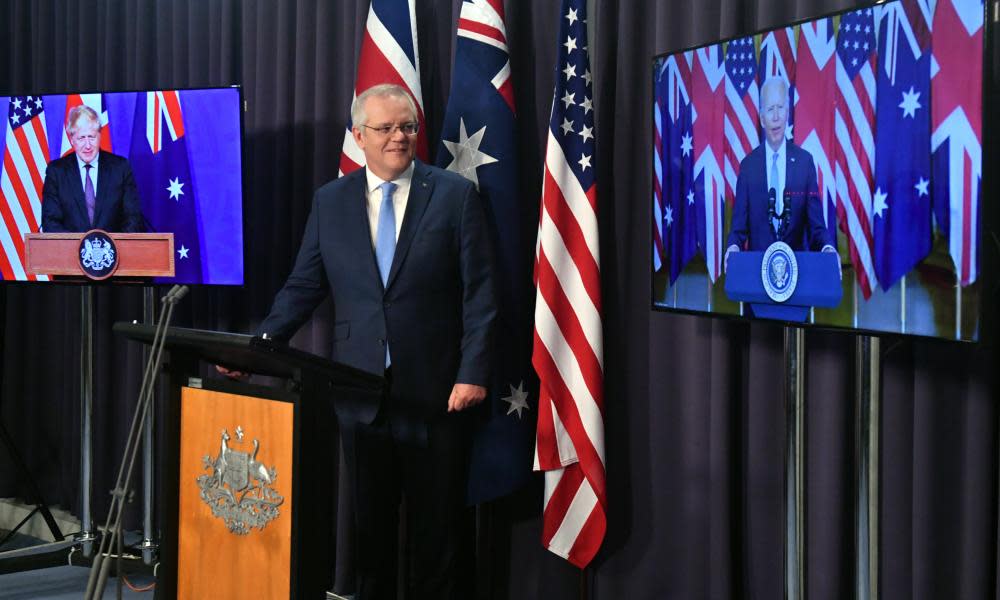Game-changer or irresponsible? The known unknowns on Australia’s nuclear submarine deal

It started, as defence stories so often do, with an acronym. Australians woke up on Thursday morning to Aukus – a new Australia/United Kingdom/United States alliance formed to tackle the rising threat of China.
(Aukus studiously avoided the ‘C’ word, but we all know that’s what they were thinking).
News of the three-way alliance born at the June G7 trilateral came with the shock announcement that Australia would scrap its existing $90bn submarine project in favour of nuclear-powered boats. Instead of 12 French-design submarines, Australia will get “at least eight” designed in the UK or the US and built in Adelaide.
The backlash was swift. New Zealand – which was left out of the gang – will continue its nuclear-free policy and ban any nuclear-powered submarines from its waters. The Greens and anti-nuclear campaigners were scathing.
Related: Australia considered buying nuclear submarines from France before ditching deal, Peter Dutton says
Paris called it a “stab in the back”. France said it had no warning of the deal, and heard about it from the media. Then, French officials were told their US counterparts were unavailable to meet.
“We only heard about it yesterday,” the armed forces minister, Florence Parly, told RFI radio.
The Australian prime minister, Scott Morrison, said he discussed it with the French president, Emmanuel Macron, after the G7.
Beijing called it “extremely irresponsible”.
It was a lot to take in. But, to channel Donald Rumsfeld, those are the known knowns. There’ll be plenty more to come as we try to answer the known unknowns.
What are we getting?
If the new plan, unlike the old plan, goes to plan, we will get a fleet of nuclear-powered submarines. At least we know how they work.
We do not know yet if they will be based on a UK or a US design, but it is more than likely they will be powered by the sort of reactor in the US Virginia-class submarines.
Why?
Let’s put to one side the broader question about Australia’s role in and obligation to global stability and to keeping the US happy.
Plenty of defence pundits have been arguing that we need the stealth and reach of nuclear submarines, instead of the diesel-electric ones we ended up ordering. The idea has usually been quashed by the government because we don’t have sovereign nuclear capabilities. Apparently that doesn’t matter any more. (Or does it?)
Guardian Australia’s political editor, Katharine Murphy, stepped us through the factors that led to the decision, and the unknown long-term ramifications. The former defence minister Christopher Pyne said new technology that means they never have to be refuelled was a “game-changer” that led to Australia’s decision.
And yet, the decision was made in secret, and came as a global shock. The government may have sealed the deal quickly, but there is still a lot to unwrap.
What about the jobs?
Morrison promises there will be a job bonanza for everyone, but funnily enough some people feel a little insecure. Naval Group Australia employs about 350 people, who will be looking for new gigs. There are companies that have geared up to supply goods to Naval Group that do not know if they will be left like the proverbial shags.
The government says the new (proposed) submarines will have 40% local content, compared to the 60% promised by Naval Group.
And there will be fewer boats built, too.
Still, Australia has a historical shortage of submariners, so at least they will be in high demand.
Show me the money.
Email: sign up for our daily morning briefing newsletter
App: download the free app and never miss the biggest stories, or get our weekend edition for a curated selection of the week's best stories
Social: follow us on YouTube, Facebook, Instagram, Twitter or TikTok
Podcast: listen to our daily episodes on Apple Podcasts, Spotify or search "Full Story" in your favourite app
Australia has already spent $2.4bn on the now-scrapped project – Morrison says the money was not wasted, although it was dedicated to the building of a very different boat. To get out of the contract will cost hundreds of millions (but we don’t know yet if France might have legal recourse to get some more compensation).
That’s a lot of money. You know what else will cost a lot of money? At least eight new submarines. And no, we don’t know how much.
How quickly can this new military-industrial endeavour swing into action?
One of the enduring concerns about the future fleet was that it was going to take so long to get them operational, we would have to stretch out Australia’s existing Collins-class fleet with extensive refits. We will still have to do that.
First there will be an 18-month study to work out the plan. And it will be a decade before the boats start to hit the water. So at this stage, when it comes to the timeline, we are pretty much where we were before.
So, stay tuned as we battle the notoriously secret defence establishment to work out what we are getting for our taxpayer dollars, and when, and maybe why, and whether it’s worth it, and whether we have irreparably damaged our relationship with France, and by extension, with Europe.
Still, at least we know the basics. Such as the name of our prime minister. Even if the US president maybe doesn’t.

 Yahoo News
Yahoo News 
